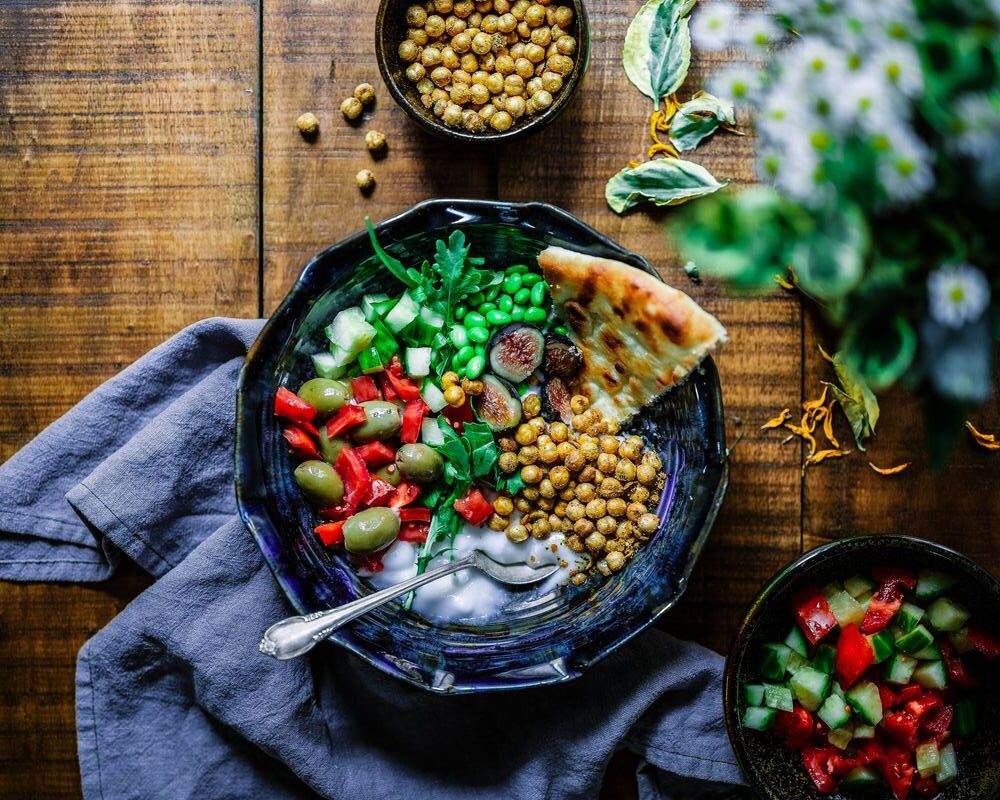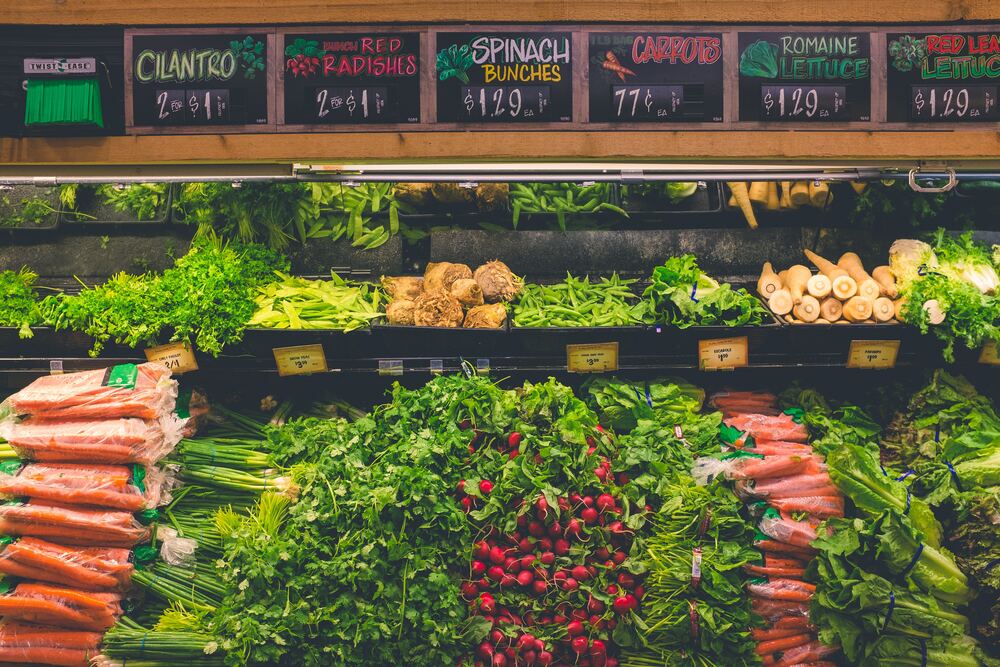What we eat impacts the way we feel
We all know that what we eat can have an impact on how we feel. Eating something that has appreciable amounts of (added) sugar, fat, and/or salt can make you feel jittery or even dizzy. When I experienced panic attacks, I used to always have dextro energy tablets with me in case I felt faint and needed something to instantly feel better. I didn’t know then that it was actually doing the opposite: it would only make the anxiety worse.
The microbiome—all the bacteria and other microorganisms that reside mainly in the gut—has a direct relationship with our immune system, digestion, metabolism, hormones, and general well-being. The brain-gut connection is so strong that it is often referred to as our second brain. Having a bad gut microbiome can cause stress and anxiety. So if you are someone who experiences anxiety or even panic attacks on a regular basis, it can be helpful to take a closer look at your diet.

Nutrition can be confusing
In nutrition science, or any field of science for that matter, not all the evidence provided by scientific research is equally strong. The highest quality of evidence is found in meta-analyses and systematic reviews, followed by randomised controlled trials (RCTs). Below that are observational studies. Lowest on this hierarchy, and weakest in evidence, are expert opinions, case studies, and laboratory and animal studies. That does not stop news articles from highlighting conclusions from these kinds of low-evidence studies. Nutrition seems to be tricky and confusing, and big food companies want it to stay that way.
- A lot of nutrition research is funded by the food industry (source). Results are almost always favourable to the sponsor’s interests.
- Many politicians and political parties tie up with the food industry.
- Medical professionals are not sufficiently trained in nutrition. (source)
- Study results can be misinterpreted, or a claim is made based on only studies with low evidence. This is what self-proclaimed ‘food experts’ on Instagram often do, because they are usually not trained in nutrition science. They cherry-pick studies that support the way of eating they promote.
- The media needs an ever-changing narrative and new breakthroughs to attract the public to their content.
What does the state-of-the-art science actually say?
There is a very strong body of evidence-based scientific literature showing that a healthy diet should have certain characteristics. Characteristics that are all found in a whole food, plant-based diet, but also in other diets consisting of at least 80-90% of calories from plants. (source)
These diets:
1) Are high in fibre
2) Are low in saturated fat
3) Avoid or limit (ultra)processed foods

Diet and anxiety
A whole food, plant-based (WFPB) diet focuses on:
- Fruit
- Vegetables
- Whole grains
- Legumes
- Nuts and seeds
A whole food, plant-based diet is not only good for us but also for our planet – planetary health – and animal welfare. The same way of eating might lower the risk of developing cancer, heart disease, dementia, and type 2 diabetes and is good for our guts, brain, heart, liver, kidneys, insulin sensitivity, and longevity.
OK, that sounds good, but what about anxiety?
This systematic review, based on 61 studies, showed that increased consumption of fruits and/or vegetables is associated with a positive influence on mental health. However, association does not mean causation. The paper does not conclude that eating more fruits and/or vegetables leads to better mental health, but they did find an association.
In this 18-week randomised controlled trial with 292 participants, one group was instructed to eat a whole food, plant-based diet. The other group did not get any instruction. The WFPB group reported significant improvements in anxiety, depression, fatigue, and emotional well-being.
Like we have explored at the start of this article, it’s important to keep the microbiome happy in order to be happy and feel less stressed and anxious. How can we do that? By eating a wide variety of plants! (source)
Circadian rhythm eating
Other than what you eat, you might also want to consider when you eat. You have probably heard of intermittent fasting before. Intermittent fasting is the practice of consuming food within a set time-window, for example, between 10 a.m. and 6 p.m. There are many variations, including only eating for one hour a day (one meal a day) or even fasting for a whole day. Extreme fasting like this is a stress on the body. It can increase cortisol levels and therefore increase anxiety. That’s why it might not be a good idea for people who already deal with a lot of anxiety.
However, it’s a good idea to give the body sufficient time in which it doesn’t need to digest food. Most research on fasting has been conducted on animals, and more research with human subjects is needed. (source). However, many people report feeling better when they stop eating all day long, and practise a moderate version of intermittent fasting. This can mean that you stop eating at 6 p.m. and have breakfast at 10 a.m. the next morning, with three filling meals during the day.
Eating just before going to bed can disrupt the circadian rhythm, which can increase the risk of anxiety and depression. (source). If you have trouble sleeping, it might be a good idea to stop eating any foods a few hours before going to bed.
Other factors matter too
Needless to say, diet is important, but it’s not the only factor impacting our mood and level of anxiety, such as:
- The sun: a daily 20-minute exposure to your head and arms
- Exercise: switch between sitting, standing, and walking throughout the day and incorporate a form of stretching, cardio, and weight training a few times a week (see also).
- Love and friendship: the more social support, the happier you generally are.
- Sleep and rest: lack of sleep and insufficient rest during the day affect mood and emotional health; it can exacerbate anxiety.
- Purposeful living: do you enjoy what you’re doing on a day-to-day basis?
- The belief that your actions have a direct effect on the outcome.

Extra tip #1
In this 6-week randomised controlled trial, one group of people with a diagnosis of major depressive disorder got standard antidepressant therapy, while the other group of people who had the same diagnosis got the same standard antidepressant therapy plus a daily chlorella supplement. Researchers found a significant reduction in depression and anxiety symptoms in the chlorella group. Chlorella is a type of algea that you can buy in the form of a dark green powder. Since you can easily add it to a daily smoothie, it might be worth a try!
Extra tip #2
Use the app HappyCow to find restaurants that offer WFPB-friendly meals.
Extra tip #3
The book “The Proof is in the Plants” by Simon Hill and his podcast “The Proof” are good resources to learn about the latest nutrition science and what foods to eat to be healthy and happy.